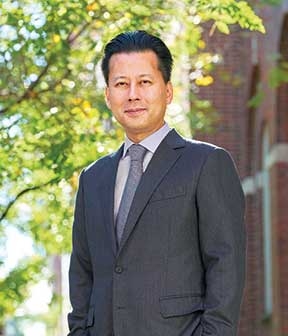Kenji Yoshino joins Oversight Board for Facebook and Instagram
Chief Justice Earl Warren Professor of Constitutional Law Kenji Yoshino has joined the Oversight Board for Facebook and Instagram, operated by Meta Platforms Inc. Established as an independent body and funded by a trust, the board was created, according to its website, “to help [Meta] answer some of the most difficult questions around freedom of expression online: what to take down, what to leave up, and why.” Board decisions about whether or not to remove content are binding and are published online, the website says. The board announced Yoshino’s appointment on February 14, 2023.
In serving on the Oversight Board, Yoshino will draw on his experience as a leading constitutional law scholar who has centered much of his work on issues of equality, diversity, and inclusion. Through his work, he says, he has grappled with “the ways in which the right of expression and right to equality can collide with each other.” As an example of this collision, he points to the 303 Creative LLC v. Elenis case currently before the US Supreme Court, in which a Colorado web designer sought to create wedding announcement websites without making sites for same-sex marriages, citing freedom of speech. “This collision between speech and equality ramifies across many different contexts, including gender, race, and ethnicity,” Yoshino notes. The Oversight Board “wrestles with that core question in a relatively novel and critically important forum,” he says.
Yoshino is the founder and faculty director of the Law School’s Meltzer Center for Diversity, Inclusion, and Belonging, and he and the center’s executive director, David Glasgow, have just published Say the Right Thing: How to Talk About Identity, Diversity, and Justice. Yoshino says he expects a central area of overlap between the book and his role on the Oversight Board is that “they both operate at the level of super-compliance”—taking in considerations for expression and conduct beyond what the law mandates. Yoshino is fascinated by questions such as: “What social guardrails should we put around conversations when they relate to sensitive subject matter, such as issues of identity and diversity? And how might the answer differ depending on whether you are an individual, a workplace, an educational institution, or a tech platform?”
While Say the Right Thing explores conversations on social media, its focus is on in-person settings. Yoshino’s work at Meta will allow him to examine those questions from a different vantage point. The primary difference, he says, is one of scale: “an interaction that in an earlier time might have been a one-on-one conversation or one-on-twenty conversation becomes a one-on-two-million conversation or two-million-on-one conversation. We as a global society have not yet fully metabolized these nuances.”
Postings on Facebook and Instagram also reach users around the world, adding another layer of complexity. “We need not only to understand the global scale of communications, but also to understand that words and expression occur in a localized cultural context and depend on that context for their force and meaning.” “That tension,” Yoshino says, “is one of the most compelling issues of our time.”
Posted February 14, 2023


